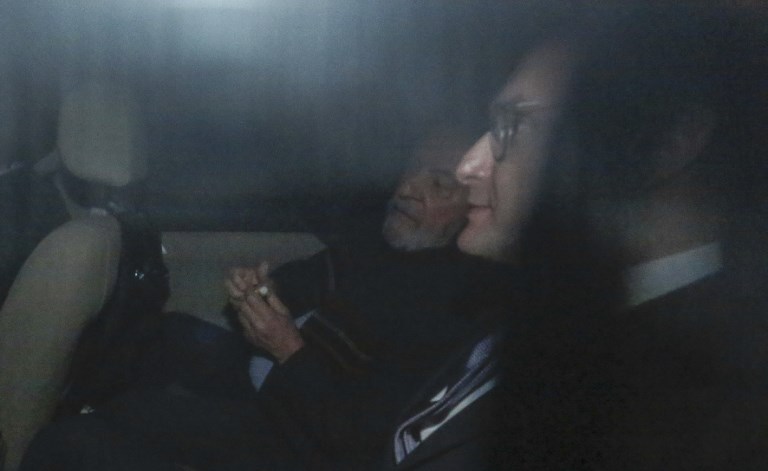
/ AFP Photo / Miguel Schincariol
by Paula Ramon
© Agence France-Presse
SAO PAULO, Brazil (AFP) — Brazil’s former president Luiz Inacio Lula da Silva, once one of the most popular politicians on the planet, was given 24 hours to surrender to police Thursday and start a 12 year prison sentence for corruption.
The order from Judge Sergio Moro, head of Brazil’s huge “Car Wash” anti-graft probe, came as a complete surprise given that lawyers had earlier said the leftist former two-term president had at least until Tuesday before he’d have to go behind bars.
Lula, 72, easily leads polls in Brazil’s October presidential election and his apparent downfall will throw the race completely open.
Moro’s office said that in view of Lula’s stature as a former president, he would have “the opportunity to present himself voluntarily” to police in the city of Curitiba, where the “Car Wash” probe is based, by 5:00 pm (2000 GMT) Friday.
There was no immediate reaction from Lula, who had been described earlier by supporters as facing his jailing calmly.
However, Senator Lindbergh Farias, from Lula’s Workers’ Party, issued a defiant call for supporters to congregate in front of Lula’s house in Sao Bernardo near Sao Paulo on Friday.
“Moro ordered prison for Lula. Everyone to Sao Bernardo tomorrow from 5:00 am in front of Lula’s house!” he tweeted.
Lula had been due to address a Workers’ Party rally in the city on Friday afternoon, but that event would now coincide with Moro’s surrender deadline.
Court ruling
Lula petitioned to the Supreme Court on Thursday to be allowed to remain free while pursuing appeals in higher courts against his conviction for receiving a seaside apartment as a bribe from a construction company. A lower court appeal failed this January.
However, the Supreme Court judges ruled 6-5 in a marathon session that under the law, Lula must begin his sentence after having lost that first appeal.
Still, it had been widely expected that with more technical appeals, Lula would start his sentence only sometime next week at the earliest.
Brazil’s left is furious at the Supreme Court ruling, seeing Lula’s imminent imprisonment as a plot to prevent the Workers’ Party from returning to power. Party leader Gleisi Hoffmann said the court ruling violated “constitutional law and the presumption of innocence” and made Brazil “look like a little banana republic.”
However, there were celebrations on the right and among prosecutors supporting the epic “Car Wash” probe, which has revealed high-level corruption throughout Brazilian business and politics over the last four years.
To them, Lula epitomizes Brazil’s corruption-riddled elite. His conviction on charges of accepting a seaside apartment as a bribe is “Car Wash’s” biggest scalp by far.
Campaign from behind bars?
Lula, who grew up poor and with little formal education before becoming a trade union leader and politician, says he will go down fighting.
Analysts say that his election hopes have now been dealt a body blow. But he is not necessarily knocked out.
In theory, once someone has been convicted and lost their lower court appeal, they are barred from running for office under Brazil’s clean slate law. But the issue will not be decided for months.
Lula has until mid-August to register his candidacy and only after that will the Superior Electoral Tribunal rule on whether his candidacy is valid.
Even if he were barred, as seems likely, he would have an opportunity during that period to exercise influence on his followers, possibly preparing the way for a replacement candidate.
“The party’s idea is to maintain his candidacy whatever the circumstances until the (election court) turns him down, and to start working on a name as plan B,” Globo political columnist Gerson Camarotti wrote Thursday.
Michael Mohallem, a politics professor with the Getulio Vargas Foundation, said “he probably won’t have the conditions to be a candidate.”
“Brazilians would surely have trouble with this, rejecting a candidate who was in prison,” he said.
In the latest election polling, Lula scores more than 30 percent, with his nearest rivals in a crowded field getting only around half that.
Reflecting profound polarization in Brazil, the runner-up would be hard-line former army officer Jair Bolsonaro, an open fan of Brazil’s 1964-1985 military dictatorship.
Current center-right President Michel Temer — who took over in 2016 after the hugely controversial impeachment of president Dilma Rousseff from Lula’s Workers’ Party — is himself accused of serious corruption.
Temer however has been shielded by Congress, which is dominated by his allies, and has not had to face trial.
A new poll from Ibope that was published Thursday showed only five percent of Brazilians think Temer’s government is doing a good or very good job.
© Agence France-Presse







